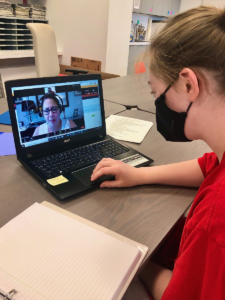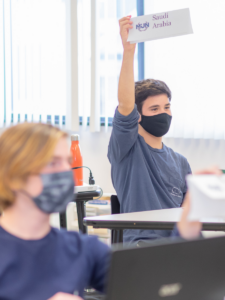Why Your Student Needs a Progressive No Grades High School

What if a high school has no grades? No Advanced Placement (AP) classes. No International Baccalaureate (IB) program. To most parents in Northern Virginia, this is profoundly unsettling information. They ask, “How will my child get into college?”. The current model is not working for many students, but parents are afraid of the unknown. What they don’t know is that a progressive high school like The Sycamore School (TSS) may be precisely what they need to get into college.
The college admissions process has changed dramatically since most parents were in high school. More students than ever are applying to college and acceptance rates have dropped considerably. In 1970, 152,000 students were enrolled in college, by 2000, that number had increased to 382,000 students who were enrolled in college in Virginia. [EducationData.org; July 2021] This is a particular challenge in Northern Virginia, where nine out of the top ten top high schools in the state are located. [Best Virginia High Schools; UsNews.com]. When there are hundreds of qualified students just like your child applying to the same college, competition for those spots is fierce.
Setting Your High School Student up for College Admissions Success
Despite popular opinion, letter-based grading is an incomplete measure of learning and testing isn’t the only way to demonstrate student achievement. However, if there are no grades and no standardized tests, how does a school reflect a student’s success? How will colleges know which students to accept? Read more to discover alternative ways your child can showcase their depth of knowledge and achievements for college applications.
Teacher Recommendations
Colleges heavily rely on teacher recommendations to ascertain a student’s academic achievements and work ethic. A detailed and genuine teacher recommendation can make a strong positive impact on a college application reviewer. How well does your child know their teachers and school counselor? How well do teachers and school counselors know your child? Will they take the time to write a strong recommendation? Will it speak to your child’s strengths? How different will it be from any other recommendations? Will it stand out?

Most high school teachers and school counselors have caseloads that include hundreds of students. Because Northern Virginia schools are large, teachers and counselors have less time to spend with each student. At TSS with our small class sizes, our teachers develop meaningful relationships with their students. They also foster an environment where students become open to learning, discover how they learn best, and ultimately, drive their own learning process. As a result, our teachers help our students become the best version of themselves and can write detailed and meaningful recommendations that speak to each student’s strengths and accomplishments. Our school counselors help each student through the application process to find and apply to schools that best match their future plans.
Portfolio Application
A traditional high school experience yields a transcript of letter and number grades. It does not give a picture of who the student really is and what they have actually learned. At TSS, our mastery-based learning produces a portfolio of work the student submits to colleges using the framework of the mastery transcript consortium. The student is not defined by arbitrary numbers but is able to showcase their unique talents through submitting work samples, teacher narratives, and mastered skills. Our counselors meet with college admissions officers to discuss students’ strengths and showcase achievements.
We have found this approach to be transformative for our students. Those who were previously struggling simply to get a D in a traditional public high school transform themselves into strong students at TSS.
“I know my daughter is bright. But that intelligence would not have been evident had she come out of the public school process.”
“I was blown away when she was accepted to all five schools and received scholarship offers for up to 92% of tuition without SAT or ACT scores.”
Different is Good
In a large box of chocolates, nothing stands out. But wrap one of those chocolates in a small box and it is unique and special. Locally, high school students are competing against large numbers of their school peers for admission into the same schools. According to Arlington Magazine, over 450 Arlington Public Schools students applied to the University of Virginia in 2020. [20 Most Popular Colleges for Arlington’s Class of 2020, Arlington Magazine; November 16, 2020] They were all fairly equally qualified, but unfortunately just over 120 were offered an admission spot. The best schools in Virginia could fill their school with quality Northern Virginia students. A student coming from a small private progressive high school with recommendations from teachers who know them is going to stand out in a sea of students from the area.
Setting Up Your Child For Success After High School
Strong Writing Skills
Writing is a key skill not only for the college admission process but also for college and for life. Unfortunately, schools that are forced to teach in preparation for standardized tests are not permitted the time in class to truly develop the writing skills of all students. Strong writers and high performers will see improvement as they enjoy writing and are self-motivated to improve their writing. However, students who struggle to initiate writing and perceive writing as a weakness are often left behind. As a result, many students do not develop strong writing skills in a traditional school setting. In an environment where lots of students achieve good grades, being able to write well can really set a student apart from their peers.
Acquired Skills
Colleges are looking for students who will succeed at their schools. With “approximately 30% of college freshmen dropping out before their sophomore year” [EducationData.org; July 2021], they want students who have not only demonstrated academic knowledge but also acquired skills needed to be successful in college. Those include strong organizational skills, time management, study skills, initiative, self-advocacy, problem-solving, critical thinking, ability to work well with others, effective communication, and cognitive flexibility.
Teaching High School Students to be Active Learners

What do you want your kid to learn? What do you want your child to get out of high school? In our mainstream high schools, there is an overemphasis on compliance. Can your child turn in all this busy work on time? Can they jump through the hoops set before them? Can they memorize info to regurgitate on a test?
In college, you aren’t given busy work and you aren’t sitting in classes 6-7 hours a day. Instead, you are expected to go to your classes for 2-4 hours a day and then structure all that unstructured time for yourself – to study, eat, sleep, do laundry, and socialize. No one makes sure you get to class, go to bed on time, or do your homework. You have to do it for yourself. Also, homework is different. Yes, it depends on your major, but in general, it’s a LOT of reading, writing, and studying. Do your kids know how to study? Do they know how to listen to a lecture and take effective notes? Do they know how to get information from their short to long-term memory? These are all valuable skills for college and life that are too often neglected in traditional high schools where the emphasis is on memorizing facts so students can excel on standardized tests.
At some point, students need to learn how to think for themselves and think creatively. They need to understand how to learn. They need to discover how they learn best; what is important to them; and what they are passionate about.
Deeper Learning: Learning Something Faster Isn’t Always Better
The traditional school system is designed to crank out compliant learners versus creative ones. Number or letter grades discourage students from taking the academic risks that push them to think creatively and unconventionally. Progressive schools that follow a mastery-based learning model measure how well students mastered skills. Students are not punished for trying something different. Instead, they are encouraged to try again. Problem-solving and creative thinking are valued in college and by employers after college. Beyond high school, you will never have the same rote requirements, nor will you receive grades as a measure of success.
We have all heard a parent say “my student is smart and must be in an accelerated class.” The parent thinks they are advocating to ensure the best learning opportunity for their student. For some reason, most of our society has embraced the idea that accelerated learning is the key to success. Faster is better. My kid is studying geometry in the 9th grade! Well, my kid studied geometry in the 8th grade. I’ve got you beat; my kiddo studied geometry in the 6th grade! Who cares? Why is that the goal – to study a subject as young as possible?
Instead, might it be true that we have a learning progression for a reason? Our brains are not fully developed until we are at least 25 years old and the last part to develop is our frontal cortex. Fluid intelligence, which includes abilities like solving problems and identifying patterns, peaks around age 30. By contrast, crystallized intelligence, which deals with vocabulary and knowledge of facts, increases until about age 50. (When the Brain Starts Adulting; November 2018; Brainfacts.org) Putting our kids in accelerated classes isn’t going to speed up that process.
In addition, if a child has ADD/ADHD, there can be a delay of 3-6 years in the development of their prefrontal cortex, which is associated with executive function skills. That means that many high school seniors might not be able to navigate the organizational skills required to excel in college…yet.
Let’s also talk about abstract reasoning. Children start to move from concrete to abstract reasoning around 12 but this progression continues until adulthood. So, if we are requiring our middle schoolers to use abstract reasoning before they have acquired that ability, that doesn’t seem as if we’re setting them up for success.
Instead, wouldn’t it be preferable to teach for the retention of concepts? Instead of moving swiftly through our math concepts (or science, English, history), how about we instead slow down and make sure our children understand concepts and can apply those skills before we move onto a new concept? This style of learning is the hallmark of a mastery-based learning model.
AP, IB, and Dual Enrollment: Are they Really Worth it?

Many parents and students are convinced that enrolling in as many AP classes as possible is beneficial. As a result, the whole AP system has broken down. AP classes were originally designed for a few advanced students to take ONE AP class in a subject area where they excelled. The level of rigor was supposed to parallel a college class. However, teachers have been tasked with the conundrum, do I teach a high school class with the rigor of a college class? If so, parents and students complain about the difficulty and workload of the class. As a result, many AP courses are watered down and don’t resemble a true college class. In recent years, many local elite private high schools in the Washington metro area, including Georgetown Day, Holton-Arms, Landon, Maret, National Cathedral, Potomac, St. Albans, and Sidwell Friends have announced they will no longer continue to offer AP classes. [InsideHigherEd.com; June 2018]
There is a reason students graduate from high school before they enter college. Adolescents need time in high school to develop their executive functioning skills, understand their strengths and areas of growth, recognize how they learn best, determine what interests them, and take risks. Taking early AP classes stunts that development and reduces their self-discovery. Why is taking a college class in high school desired or preferable? Parents often complain that their child wants to grow up too fast. We need to stop asking our children to achieve academic tasks that they may not be ready for. We need to let them be high school students in high school. True college-level classes can wait.
If we really think a student is ready for a college class, dual enrollment is a better option. However, I think it should be ONE class during a student’s senior year. It can demonstrate how college classes differ from high school ones in expectations and workload.
IB is a great model for some students, especially those who have already developed strong writing skills. But, it’s a lot of work. You have to think carefully about whether that model is the best fit for your child.
Life After High School: Different Paths to Success
Parents need to step back and think, what do I want for my child? One size does not fit all.
Often too late, parents are struggling with the conundrum of – my child struggled in high school and now is moving on to college…or not…and I’m not sure how he/she is going to do. Do they have the skills to be successful? Are they mature enough? Can they do it for themselves?
At TSS, we focus on the skills needed for students to be successful not only in college, but in life: executive functioning skills, research skills, effective oral and written communication, critical thinking and problem-solving, understanding self and others, and self-directed learning. We take away all the busy work and focus on strengthening writing skills, reading comprehension, study skills, cognitive flexibility, self-advocacy, and self-awareness. Students are given opportunities to participate in externships that explore career interests. They take classes specific to life beyond high school, such as career exploration and personal finance. They build a resume, learn how to conduct an informational interview, and are paired with a mentor to complete a capstone project. Their senior year, they take a senior seminar that focuses on essay writing, completing college applications, and/or preparing for life beyond high school.
There is another hard truth in this. Not all students SHOULD go directly from high school to college. Some are not ready and would be better served going to a trade school, taking a gap year, and or going directly into the workforce. At TSS, we work directly with students and their families to help them figure out what the right next step is for them beyond high school. Many students, especially those with ADD/ADHD, often are not yet ready for college. They need more time for their frontal lobe to develop and for them to acquire the skills necessary to be successful in college. Some students need to figure out a goal or desired career first and that gives them the motivation to get through college. Not every child loves to learn. Not every child thrives in a traditional academic setting. Some kids excel when they are working with their hands or out interacting with others in the community or coding on a computer. We don’t just need doctors, lawyers, and teachers. We also need electricians, mechanics, and plumbers. Also, being a doctor is not the only occupation in the medical field. There are also nurses, physician assistants, pharmacists, physical therapists, and occupational therapists. We need to open up our minds as to what success means.
What Do We Want for Our Children?
As parents, it’s easy to get caught up in the college admissions craze. We have inflated the importance of a four-year college experience and forgotten that our children (we hope) will be alive 80+ years. What do we want that life to look like?
I want my children to be able to live independently, find a job that they enjoy, find their people and have a village of supportive individuals who love and care about them, and give back to their community. In order to do that, my kids need to be able to think for themselves, problem-solve, pick themselves up and move forward after failures. While I want my children to be happy, it’s also important that they know how to get through hard times, be resilient, have perspective, and have grit. They need to know how to do hard things. They need to know when to ask for help and who to trust.
So ask yourself – Is my student’s school setting them up for success? What is my child learning in school? How does my child feel about themselves? What skills does my child have and what do they need to acquire? If you are not sure, then a change to a small progressive high school might be what they need to develop to their full potential. All students have unique strengths and differences. While many can manage a traditional high school environment, pushing a child into a model that doesn’t suit their learning style will result in an unhappy, and ultimately, unsuccessful student.

